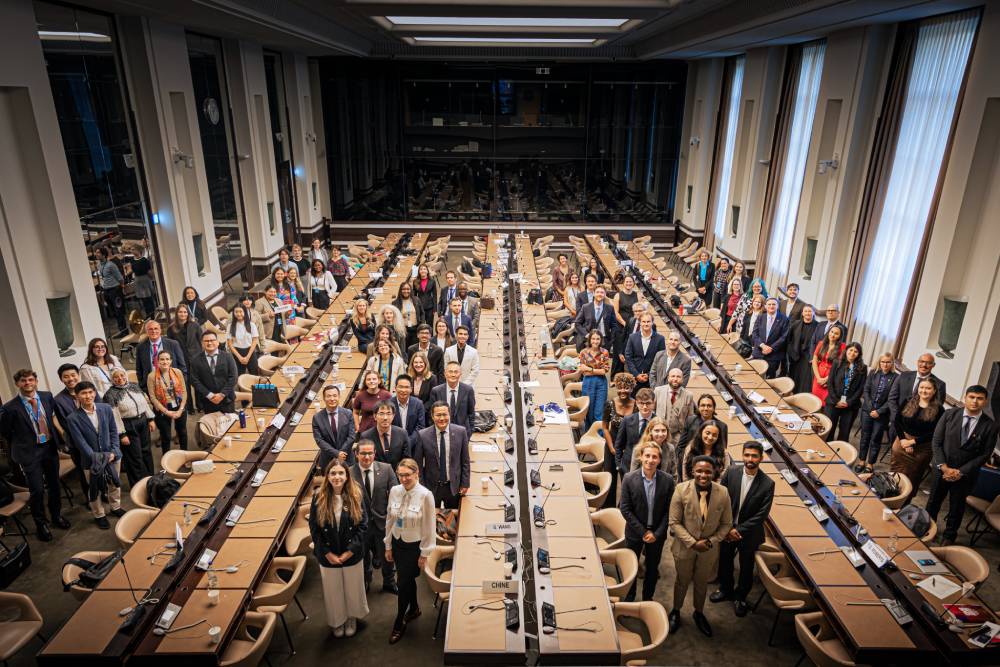UNIDIR hosted its annual Outer Space Security Conference on 9–10 September, gathering over 1,000 in-person and online participants to explore how the world can protect the peaceful use of outer space.
As outer space becomes increasingly critical to global security, economic development and daily life, so too do the risks – from the development of counterspace technologies, the growth of dual-use and dual-purpose technologies, and emergence of more robust space policies.
Two days of strategic dialogue
The annual conference, which brings together the diplomatic community and experts from industry, the military, academia and civil society, provides a vital opportunity to engage in dialogue on the complex challenges surrounding outer space security.
This year’s programme featured a compelling lineup of:
- Keynote conversations, including a high-profile opening session featuring the heads of UNIDIR, International Telecommunication Union, and United Nations Office for Outer Space Affairs —highlighting shared multilateral leadership in shaping responsible space governance.
- Panel sessions with a diverse range of experts, including:
- Fact or fiction? Exploring emerging technologies and their impact on space security, which examined AI, quantum communications, cyber-secure architectures, and autonomous systems; and
- From principles to practice: Evolving approaches to space security and PAROS in all its aspects, which explored differing approaches to achieving the goals of preventing an arms race in outer space (PAROS).
- Commercial actors and space security: Evolving challenges, roles and responsibilities, which looked at the dual-use and dual-purpose natures of many commercial space systems, their growing role in global operations, and practical steps to foster innovation while promoting space security and the goals of PAROS.
- Interactive technology demonstrations – a focused deep dive led by technical experts into space systems and services, followed by a Q&A for participants to explore capabilities, use cases, and potential applications.
- Presentations from a leading sci-fi author on the role of fiction in imagining space security futures.
"The weaving of space systems into our everyday lives cuts both ways. Isolated though it may seem, space cannot escape the consequences of the international security situation on Earth."
— United Nations Institute for Disarmament Research (@UNIDIR) September 9, 2025
– UNIDIR Director Robin Geiss opens #OS25 🗨️ pic.twitter.com/wkyoyp9F0a
Amplifying youth voices
For the second consecutive year, the conference spotlighted young voices through a global video challenge. Selected entries were premiered during the event and shared across UNIDIR’s platforms – ensuring youth voices from around the world are represented in the conversation on space security.
This year’s theme invited youth to envision themselves in positions of leadership in 2050 – whether as policymakers, orbital traffic controllers, regulators, or technical experts – and describe the challenges they face and how they are responding to safeguard outer space.
From more than 150 submissions, four winners from Bulgaria, Australia, Nigeria, and Zambia were selected and invited to attend the conference to present their work here in person.
Building knowledge and awareness
UNIDIR’s Space Security Programme works to advance understanding of space-related challenges and promote collaborative solutions that preserve the stability and sustainability of outer space. It does so through global convening such as the Outer Space Security Conference, as well as its digital tools such as Space Security Portal and Lexicon for Outer Space Security.
Looking ahead, the programme is also launching an annual Space Security Research Fellowship to equip emerging professionals with the skills, networks, and practical experience necessary to address the complex challenges of outer space security. By investing in early-career professionals from around the world, this initiative will contribute to delivering tangible, policy-relevant research while building a diverse network of future leaders who will carry forward the principles of peace, security, and stability in outer space. More details will be made available in 2026.
By fostering inclusive dialogue among governments, industry, academia and civil society, the programme supports the development of technical, legal and normative policy solutions to keep space peaceful, secure and accessible to all.
